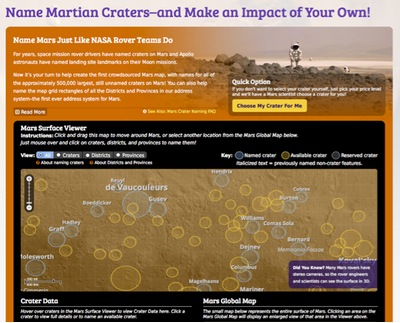Uwingu: making an impactby Alan Stern and Mark Sykes
|
| In just ten days, more than 7,000 crater names have been assigned by people from 78 countries on Uwingu’s Mars map—far exceeding the roughly 1,000 craters that the committee-based naming process yielded over the past 50 years. |
Because you read The Space Review, you likely know that Uwingu has been in the news lately with our initiative to create a new map of Mars with names given by the public to all 500,000+ scientifically cataloged, but still unnamed, Martian craters. Through our web site at www.uwingu.com, we’re offering the opportunity for anyone to engage in exploration by assigning names to previously unnamed craters on our map of Mars.
In just ten days, more than 7,000 crater names have been assigned by people from 78 countries on Uwingu’s Mars map—far exceeding the roughly 1,000 craters that the committee-based naming process yielded over the past 50 years! Uwingu charges people to engage this way, and uses the after-expense proceeds to fuel The Uwingu Fund. Uwingu Fund grants have already been given to organizations like the SETI Institute, Astronomers Without Borders, Mars One, and the Galileo Teacher Training Program.
Once all the cataloged Mars craters have been named, we estimate that over $10 million will have been generated for The Uwingu Fund. And as soon as The Uwingu Fund accumulates $1 million, we plan to begin funding individual researchers and educators through a competitive proposal process.
Our Mars map project has received considerable press attention in the past two weeks, with favorable stories from both leading US astronomy magazines (Astronomy and Sky & Telescope), both Time and Newsweek, and blogs like The Spacewriter’s Ramblings and GeekMom. During the same two weeks, our mailing list has grown to over 10,000 people, and over 50,000 unique individuals have visited our web site.
Last week, the Mars One commercial space project announced that they will fly our map to Mars in 2018, and use it in their mission operations. This week, the president of Astronomers Without Borders endorsed Uwingu’s Mars map.
| We believe the public understands exactly what it is doing when engaging in our Mars map. They are participating in space exploration in meaningful new ways, and simultaneously helping to make Mars a real place. |
But Uwingu’s populist, crowdsourcing approach to crater naming on our Mars map has generated controversy within some circles, particularly the International Astronomical Union (IAU), a professional organization of about 10,000 astronomers. Their leadership has attempted to portray Uwingu as a commercial victimizer of an unknowing public.
We believe the public understands exactly what it is doing when engaging in our Mars map. They are participating in space exploration in meaningful new ways, and simultaneously helping to make Mars a real place—a place humans are going to increasingly explore, first remotely and later in person. And that will now happen with the benefit of Uwingu’s maps featuring crater names given by everyday people here on Earth.
The publicly contributed crater names growing across Uwingu’s Mars map are often given for loved ones, special spaces, or explorers, but they are also sometimes just funny or cute, like LoveBug.
Uwingu believes that parents, grandparents, lawyers, lovers, students, and businesspeople—everyone—can plan an important role in humankind’s exploration and mapping of other worlds. We have dedicated ourselves to that cause, and to generating a significant new source of grant funds for space research and education in the process.
The IAU has done great things for the astronomical sciences, and will continue to, we are sure. But it is misguided in its effort to discourage the public’s participation in the creation of a crowdsourced Mars map, and to presume that every place name contributed to Mars maps must be approved by self-appointed committees of astronomers.
As the Red Planet increasingly becomes the focus of human exploration by both governments and businesses, the IAU, to which we belong, needs to realize that space is becoming a place for many kinds of human endeavors in addition to science, and that this is healthy.
So many people like space, like planets, are excited about exploring our closest neighbors, are yearning for a way to participate, and enjoying that they are simultaneously creating a new funding stream for its exploration.
Uwingu says let’s do that together, not as a closed club but as a species!
